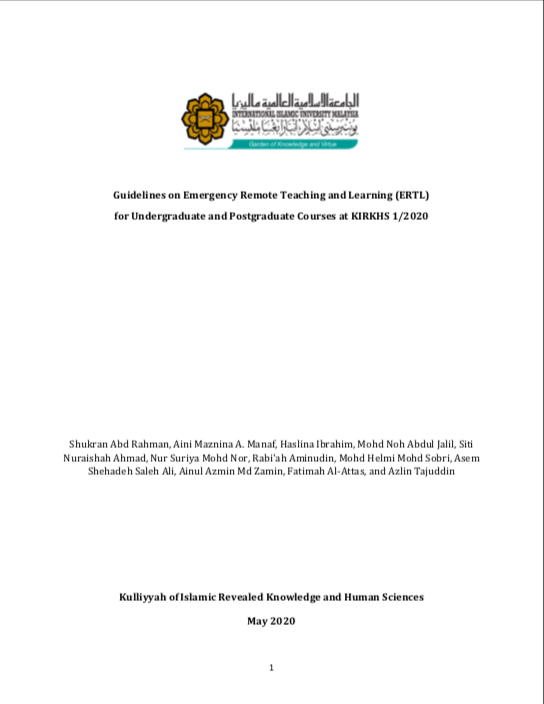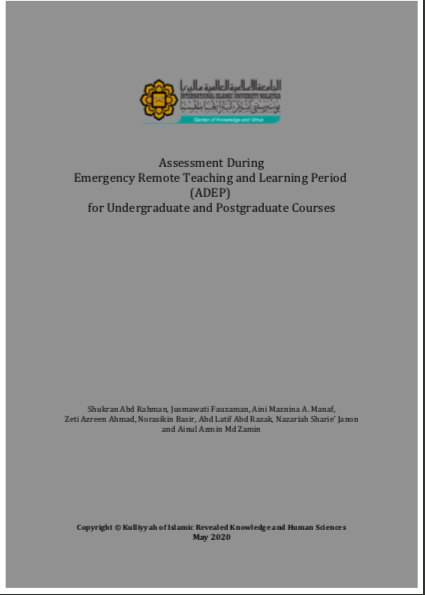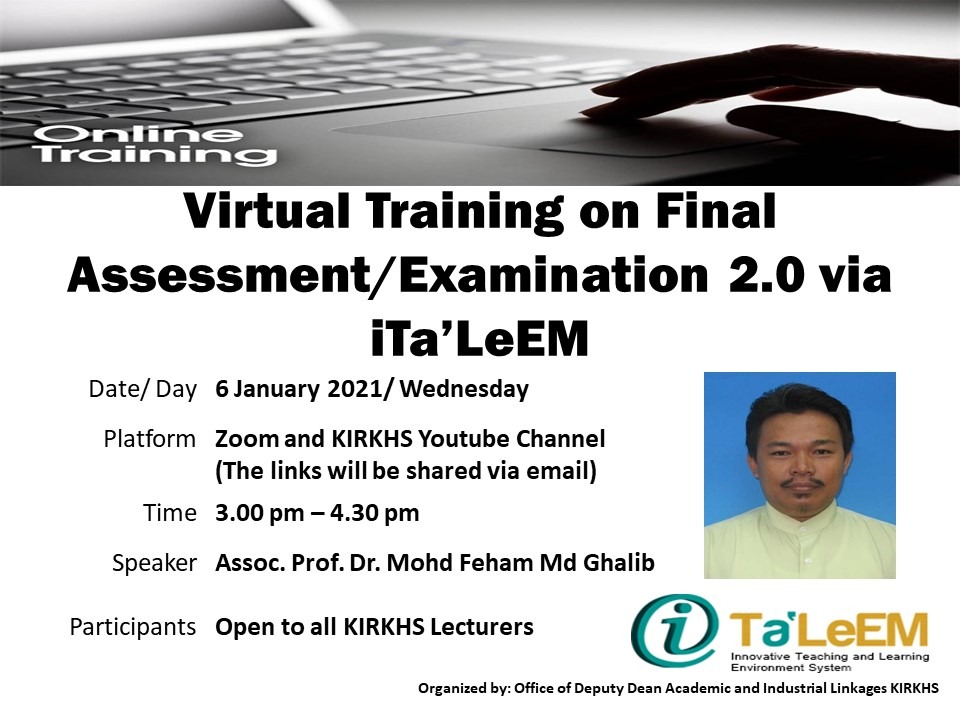By Aini Maznina A. Manaf and Shukran Abd Rahman
COVID-19 has been announced as a pandemic, causing changes in various aspects of human life and their socio-economic activities. Almost all activities, including at higher learning institutions, have to be suddenly stopped, causing universities being pushed to change the way they deliver their activities, including teaching and learning.
As we celebrated the coming of the New Year 2021 last month, the world was still struggling with the pandemic. Its spread has left the worlds economic, business and higher education sectors counting the costs and impacts due to lockdown measures taken by many governments all over the world.
The past year has seen many measures being taken by higher learning institutions in making sure all activities could continue to take place. Almost all universities have shifted from having physical teaching and learning processes to virtual classes and conducting online examination. Nevertheless, the extensive use of online tools and wide application of technology have placed universities in challenging times. Academics and students alike have to adopt various new activities or new normal as alternatives to the usual learning and teaching approaches.
Like in other higher educational institutions in Malaysia and abroad, academics and students at the International Islamic University Malaysia (IIUM) have been adopting new teaching and learning processes since almost a year ago. In this regard, the Kulliyyah of Islamic Revealed Knowledge and Human Sciences (KIRKHS) has put in place several pertinent initiatives to ensure appropriate approaches be adopted when conducting teaching and learning processes.
This requires adjustment in the conduct of teaching and adoption of new students’ learning styles. With regard to the former, the Kulliyyah has taken several measures in planning and managing essential aspects in teaching processes; among the essential ones are the conduct of classes and management of course assessment.
‹Prior to the COVID-19 pandemic, classes and lectures in KIRKHS were mainly conducted in physical classroom setting. The pandemic, and in effect, the movement control order by the Government of Malaysia, has led the Kulliyyah to replace the face-to-face class session with alternative mode of teaching and learning process, the latter involved the emergence of Emergency Remote Teaching and Learning (ERTL).
‹In supporting the implementation of ERTL, the Kulliyyah has come up with a number of swift strategies to ensure good extent of student learning despite the many restrictions due to the need to curb the spread of COVID-19 virus. The migration from face-to-face teaching and learning into its online mode has been supported by concerted efforts of various parties, essential to assist academics and students in optimally managing their teaching and learning tasks.
Hence, the Deanery of KIRKHS has developed and issued the KIRKHS Guideline for Teaching and Learning during ERTL, and Guideline for Assessment During ERTL Period (ADEP).
The two documents provide comprehensive guides to academics on the availability of various teaching as well as assessment options, which they might adopt when conducting teaching and learning process which does not require students to be present on campus.
The remote teaching and learning (RTL) approach which was later adopted at the Kulliyyah has also enabled students to follow classes from different places and time zones from all around the world. Like the ERTL, RTL is course-based teaching and learning approach, which entails synchronous online class, or asynchronous session using pre-recorded lecture, voice-over powerpoint slides, and other methods or the combination of these methods.
The decision to adopt either synchronous (live/real time session) or asynchronous (non-live session) mode or both in a course is made based on students readiness such as their level of access to internet services. In the event when the majority of students have limited access to the internet or having internet with low bandwidth, the online synchronous teaching was utilised in a minimum capacity.
‹As far as the synchronous method is concerned, the flipped classroom model is one of the highly recommended approach for academics in KIRKHS. Students are provided with subject materials such as lecture notes, powerpoint slides, or video clips prior to synchronous sessions. The materials were expected to prepare students to learn a subject matter and in turn be ready to join online discussion or problem-solving activities conducted during synchronous sessions. Among the popular synchronous platforms used by KIRKHS academics are Google Meet, Zoom and Webex.
The asynchronous teaching and learning mode is used in the event when students do not have good access to internet facilities or device at the time of official class meetings. With an asynchronous mode of teaching, students can work at their own pace and at any time convenient to them. Among the common teaching and learning activities of asynchronous session include lecturers posting announcement about classes, lecturers posting lecture notes, or supplementary course materials. Students post their assessment tasks using common online platforms such as iTaleem, Google Classroom, Microsoft Team, Padlet, EdPuzzle, Screencast-o-Matic, to name a few.
Academics in KIRKHS were given the flexibility in deciding the best online platform and approach for their courses as long as they lead to a meaningful learning process; and that the course learning outcomes are optimally achieved.
‹Despite the changes in teaching and learning approaches, the Kulliyyah has taken a number of measures to ensure optimal quality of teaching and learning process, especially on the attainment of course learning outcomes among students.
In facilitating her academics to provide effective instructional sessions and make judicious adjustment of course assessment, the Kulliyyah has taken the following measures:
1. Issuance of several guidelines for students so that they are guided on the ways to effectively handle learning processes, complete assignment, and attempt their examination.

2. Development of alternative assessment approaches with adequate regulation to ensure good level of reliability, validity and fairness of the assessment process and outcomes.
3. Issuance of guideline on the ways to effectively conducting alternative assessment during RTL written in a comprehensive guideline entitled Guideline on Assessment During ERTL Period (ADEP).

4. Conducting a series of online training to equip academics with skills to conduct Online/Virtual Teaching and Learning Process, as well as alternative assessment.


at the Kulliyyah of IRKHS

5. Establishment of the Kulliyyah Assessment Committee to guide, assess, and regulate assessment practices including designing alternative assessment in lieu of traditionally adopted examination. The implementation of alternative modes of final assessment and examination are closely monitored by the committee to ensure their high validity, reliability and fairness.
The academics experience using the RTL approach during its early implementation seems to be quite challenging especially among those who are less ICT-savvy. Although they were initially struggling with the usage of online platforms, many of them were satisfied with the way RTL was conducted.
On the students side, despite the changes in the teaching and learning approaches, it is essential for them to attain the learning outcomes of the courses they enrol. RTL mode could become a new norm for the university when academics are no longer finding it as challenging as it was in the beginning. This could be supported by certain physical face-to-face class session when students could have a more interactive learning.
Perhaps a hybrid teaching and learning approach in the Kulliyyah of IRKHS could be a more practical approach when the majority of students are allowed to return to the campus.***
(Assoc. Prof. Dr. Aini Maznina A. Manaf is Deputy Dean Responsible for Academic and Industrial Linkages, KIRKHS, and an academic in the Department of Communication)
(Prof. Dr. Shukran Abd Rahman is Dean of KIRKHS, and an academic in the Department of Psychology)
